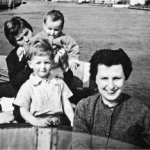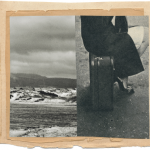Depression and an Immigrant’s Struggle to Assimilate
by Roger Cohen in the International New York Times
JANUARY 9, 2015
NEVER before have so many people been on the move. New opportunity, like a bright star, draws immigrants across the world. In every one of the past four generations my family has moved, hopping from Lithuania to what is now South Africa and on to Britain, Israel and the United States. Sometimes they have found success and happiness. But the other side of displacement, its black sun, is loss.
The strain of burying the past, losing one identity and embracing another, can be overwhelming. Home is an indelible place. It is the landscape of unfiltered experience, of things felt rather than thought through, of the world in its beauty absorbed before it is understood, of patterns and sounds that lodge themselves in the psyche and call out across the years. When home is left behind, or shattered, an immense struggle often ensues to fill the void.
I was born in London to South African Jewish parents. We left almost immediately for South Africa, lived there for two years and returned to Britain. Although the word was never uttered, we were immigrants. Our priority was assimilation into Englishness. Pogroms and penury had been left far behind. The past was as silent as a village at the bottom of a dam.
Why then was I tugged to Israel as a college student? Our Jewish identity had been dribbling away ever since my great-grandparents and grandparents left Lithuania for South Africa around the turn of the 20th century. It was a slow process but appeared inexorable.
The author’s mother, June, between sessions at psychiatric hospitals in 1958, with the author, his little sister, Jenny, and their au pair, Jette.
Having been persecuted as Jews in the Eastern European shtetl, my forebears put their faith in education and science to usher them from backwardness. My father did have a bar mitzvah in Johannesburg in 1934 but hated the experience, seeing it as an exercise in obscurantism and hypocrisy. He reached England in the mid-1950s with no inclination to inflict such instruction on me.
His was the silence, or at least discretion, shared by many Jews — whether Holocaust survivors or not — in the postwar years, especially in Europe. There was after Auschwitz something shameful about survival that no Jew could abjure. Why them and not me? Better, at least in England, to look forward, work hard, say little, and confine protest to shunning German cars.
Tradition and custom and ceremony went missing. No days were different from any other days. We did not have a Christmas tree. Nor did we have anything else. Our deity was academic and professional achievement. My father’s rise as a scientist in his adopted country was meteoric.
Nonetheless in time I wanted what I was not given, a Jewish identity, because that, simply, is what I felt myself to be, a Jew. Being called a “Yid” during my first year in high school stirred within me a lost and then defiant identity. In England, Philip Roth wrote, people’s voices always drop “just a little” when Jews are mentioned — and indeed my mother’s voice used to drop when she said the word in the land of Lewis Namier’s “trembling Israelites.”
Adaptation to England, with its retreat-from-empire gloom, proved too much for my mother, June. Born on Human Street in the small South African mining town of Krugersdorp in 1929, she was bright and full of laughter, with lovely, pale skin and thick, bouncy curls. She was highly strung, with a rapier wit. In 1950, upon graduation from Johannesburg’s University of the Witwatersrand, she married Sydney, a young doctor born on Honey Street in the Berea district of the city. A few years later the girl from Human Street and the boy from Honey Street decided to turn their backs on the horrors of apartheid. They emigrated.
June’s first depression occurred soon after. It came on after she was uprooted, bounced back and forth between England and South Africa, set down at last in north London in 1957, pregnant with my younger sister, Jenny. She had a hardworking husband and was obliged to get on with life as best she could as she raised two infants without all the support she had known in South Africa. She placed coins in a meter for hot water. She strained to fit in, to drop South Africa and its tight-knit Jewish community, to belong again. She wanted to help my father, her overriding goal always. Instead, she collapsed.
She was admitted in 1958 to a sanitarium near London. Diagnosed with “post-puerperal depression,” she first underwent electroshock treatment on July 30, 1958, and again on Aug. 1, 1958, the day before my third birthday, as it took me more than a half century to discover. Later she suffered from manic depression and never shook it off. In each generation of my family the condition recurred — a great-uncle in Johannesburg, a cousin who committed suicide in Tel Aviv at age 28. The question is whether my mother’s condition was endogenous, a purely pharmacological issue, or exogenous, a psychological issue tied to our Jewish odyssey of the 20th century and the tremendous pressure of wandering, adapting, pretending, silencing and forgetting.
There can be no absolute answer. The study of epigenetics is a relatively new one that seeks to explore how something in the external environment can, in the words of Rachel Yehuda, an Israeli-born neuroscientist and psychiatrist, “affect the internal environment, and before you know it a gene is functioning in a different way.” Evidence is growing of such trauma-induced changes. Yehuda quoted Ezekiel in a recent interview with Tablet: “The fathers ate sour grapes, and the children’s teeth were set on edge.” My mother was always on edge. After the electroshock treatment she was like a tree hollowed out by lightning. As her life progressed, she craved return to the sun and South Africa.
This was not supposed to happen. As immigrants, our gaze was to be forward-looking. June, despite her suffering, made an immense effort to that end. But the shock of upheaval can prove too much for some people. The project of starting anew collapses; its foundations are too weak.
European societies make fitting in harder than America. The difference between those who came first and those who came last in the United States is negligible beside the intricate matter of British ancestry — not to mention the subtle matter of British anti-Semitism. June had been raised in a cocoon of new South African wealth so enveloping as to eliminate, almost overnight, the Lithuanian past. I was raised an English boy, as if England were my birthright.
A child of repetitive Jewish displacement, I would sit in a Christian epicenter of continuity, Westminster Abbey, every school-day morning. This irony was lost on me. I was unaware that my paternal grandparents and much of my mother’s family came from the shtetls of northern Lithuania; or that my upbringing, while bestowing the gifts of a superb liberal education, had also been devoted to the expunging of this past, as well as to the suppression of the not-unrelated history of my mother’s mental breakdown.
I see my forebears losing touch with one another and fanning out across the world. I see the ebb and flow of their fortunes and the battle for assimilation. Theirs is a constant, almost manic, reinvention — in Johannesburg, in London, in Jerusalem, in Cleveland. Yet all the while they carry within them a bipolar gene that forms an unbroken chain with the past, liable to surface at any moment. They fight for that feeling of belonging that goes with home, the elusive place where, as Robert Frost noted, “when you have to go there, they have to take you in.”
My mother’s suicide note to my father of July 25, 1978, was found in the Hampstead house on the hill she loved; the house she had, in a bout of manic activity, agreed to sell the previous March to buy a Georgian terraced jewel on Lord North Street in central London, only to cancel the sale when she plunged back into a depression in June.
She had suffered from a combination of symptoms: weight loss, dizzy spells, hot flashes, as well as alternating hyperactivity and inertia, or manic depression. In early February, a doctor had again suggested electroshock treatment. No! Two decades on from her 1958 confinement, she would not return to that hell. She would not tolerate again the metal plates being strapped to her swabbed temples, enclosing her skull in its high-voltage carapace.
The strain of hiding her condition was enormous. She had to pursue her work as a magistrate and maintain the outward appearance of familial stability. Voiding the real estate deal concluded in manic March filled June with guilt over the time and money wasted. One thing about mania, with its rashness and rages, is that it provides plenty of legitimate reasons for remorse during the ensuing depressive phase.
My father came home from work and found the bedroom doors closed. He thought little of it. June was often in bed. He fixed himself a whiskey, sat down with the papers. It was a mild summer’s evening, sunlight glinting through the trees, clouds of gnats against the fence. June’s cycles were running at three-month intervals. With luck, come September she would be active again. Sydney tossed the papers aside. He tried the bedroom door. It was locked. He raced around to the other door, from the bathroom.
It was locked. He ran outside. The net curtains were drawn. The windows looked sealed. On closer inspection, one was very slightly ajar.
My mother lay sprawled on the bed, a bottle of gin beside her. She had taken large doses of doxepin and Valium, washed down with the gin. Her arms were thrown back behind her head.
Her pupils were scarcely responsive, her breathing shallow. The suicide note written to my father was beside her bed: “You are made to do great things, make immensely useful discoveries to aid all mankind and I’m leaving you to continue unimpeded by my burden. I so much hoped to help you and to help you and to love and adore you …” June survived, just. The emetic effect of the gin probably saved her. She vowed to us all that she would never again “resort to such a drastic step.” But death was always the cajoling voice in her ear.
June tried to kill herself again on June 15, 1982. Again there was a suicide note. Again, she survived, barely. At last cancer took her on Jan. 2, 1999, at age 69.
Mental illness is a charnel house from which nobody escapes unscathed. My parents’ marriage, in its last two decades, was filled with terrible silences and fierce eruptions. After the loss of my mother, I had to find vitality at any price. Every relationship was a mausoleum in the making.
When a parent dies unhappy, there is something unresolved that keeps nagging. It is irrational to want to save my mother from her torment — and now I cannot anyway. Still, because of her, I had to go back. The void, ever renewed, that her absence has left can be explained only by her refusal to stop believing in love, however compromised by frailty her expression of it was. Love and acceptance and stoicism and dignity were, against all odds, her fundamental and enduring lessons. Her spirit, housed too long in that troubled body, had immense strength.
IT was my father she had loved most deeply, despite everything. My father, who had begun another relationship to survive, and who had hardened with the demands and the secrecy of that involvement, crumpled with a grief that shocked him after my mother’s death. He wrote to me:
“Your expanding memories of Mom have become infinitely precious and important; I share with you the vision of a light which is the obverse of her tormenting darkness and which in some miraculous way has become completely dominant since her death. I hope and pray that this vision of her will be an enduring source of strength and inspiration to you in all the years ahead, ever cherished and unsullied.
“For myself, I did have a fleeting dream of a few tranquil years carrying me into the sunset. I still hope for that in a mental and bodily sense. But I know that my spirit will not soon be released from those cruel demons that tore so relentlessly at the entwining fabric of love between Mom and me. I did strive within the feeble limits of my human fallibility to preserve and cherish and sustain her. But alas — for Mama ultimately, death was the only angel that could shield her from despair.”
We were too undone to ask for the urn with my mother’s ashes. I do not know where it ended up. The girl from Human Street left no trace of her anguished passage across the earth, from the Southern to the Northern Hemisphere. After her high school records from Barnato Park in Johannesburg, after the bulk of her medical records from the Holloway Sanatorium near London, her very physical remains vanished, too. From an early age, I had grown used to deploying my imagination as a defense. I told many other stories with many foreign datelines before I realized, returning to the place where I began, that the one story I had to tell was hers — and through hers that of a far-flung Jewish family, tied by the pain of forgetting, the strain of assimilation, the curse of mental illness and the ever-renewed consolation of love.
Roger Cohen is a columnist and the author of “The Girl From Human Street,” a memoir, from which this essay is adapted.

The author’s mother, June, between sessions at psychiatric hospitals in 1958, with the author, his sister and their au pair.

